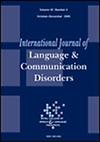Exploring the impact of stuttering simulation-based learning and personality traits on clinical self-efficacy and professional interest among speech–language pathology students
Abstract
Background
Research suggests that participating in a stuttering simulation-based learning (SBL) program could help speech–language pathology (SLP) students feel more at ease, less nervous and more capable while interacting with people who stutter. Personality traits may influence SLP students’ self-efficacy beliefs as well as their level of interest in working with clients who stutter. In particular, we suggest that the combination of low neuroticism and high extraversion, previously linked with a more outgoing, emotionally stable and social personality, may enhance self-efficacy.
Aims
To examine the impact of participating in a stuttering SBL program on clinical self-efficacy (CSE) in managing stuttering therapy among SLP students, as well as its influence on their interest in working with fluency disorders and their associations with personality dimensions. The study also evaluated satisfaction with the SBL experience.
Methods & Procedures
SLP students (n = 49) underwent a fluency disorders academic course, self-reported on CSE, and had an interest in working in the field of stuttering and NEO-Five-Factor Inventory (NEO-FFI). Post-stuttering SBL program participation, CSE and level of interest in practice of stuttering were reassessed. Satisfaction with the simulation was also gauged.
Outcomes & Results
Students interested in working with fluency disorders scored lower in neuroticism and higher in extraversion than their uninterested counterparts. Before the SBL activity, interest ratings were negatively correlated with neuroticism and positively correlated with extraversion. Pre-SBL neuroticism was negatively correlated with CSE. Following the SBL activity, increased CSE and interest in working with fluency disorders were evident, indicating robust and medium effects of the simulation on those indices, respectively. Post-SBL neuroticism was also negatively correlated with CSE. Overall, participants reported high satisfaction with the SBL experience.
Conclusions & Implications
The study suggests SBL is an effective tool for enhancing motivation to work with fluency disorders. Consideration of personality traits and professional interests in designing educational interventions for SLP students, along with tailoring approaches to individual differences, may enhance learning outcomes. The study also highlights the need to differentiate between CSE and objectively assessed clinical competence and the fact that professional development is influenced by various factors. Nonetheless, the positive correlations between personality traits, CSE and satisfaction emphasize the potential of SBL programs in shaping not only clinical skills but also the attitudes and preferences of future SLPs.
WHAT THIS PAPER ADDS
What is already known on this subject
- SLPs in the field of stuttering therapy reportedly experience low levels of comfort and professional confidence, possibly due to insufficient clinical experience. According to earlier research, taking part in SBL programs may elevate the CSE of SLP students and help them feel more confident about treating people with stuttering.
What this study adds to the existing knowledge
- In addition to showing the beneficial effects of an SBL activity on SLP students’ self-efficacy and interest in working in stuttering therapy, our research shows a significant relationship between personality traits and CSE. Specifically, the combination of high extraversion and low neuroticism was found to be associated with higher CSE and higher levels of satisfaction from the SBL.
What are the potential or actual clinical implications of this work?
- The study shows that SBL is an effective tool for enhancing motivation to work with fluency disorders. Overall, students who exhibit high extraversion and low neuroticism show higher levels of CSE, greater motivation in stuttering treatment, and higher levels of SBL stratification. Development of future SBL activities and other educational interventions should take into consideration such personality traits, to enhance learning outcomes.

 求助内容:
求助内容: 应助结果提醒方式:
应助结果提醒方式:


